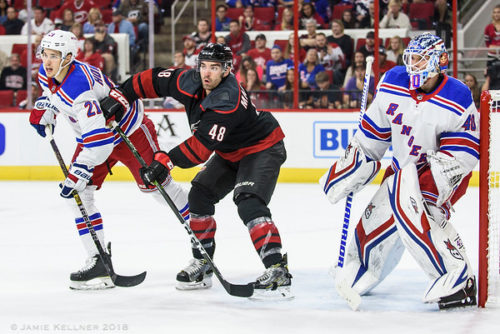Rod Brind’Amour’s arrival in Raleigh set the path for the building of the franchise and the greatest times in team history. He arrived via the most significant trade in Canes history when Canes GM Jim Rutherford somehow converted former captain Keith Primeau who was holding out for a new contract at the time into Rod Brind’Amour on January 23, 2000.
Brind’Amour had a modest four goals and ten assists in 33 games at the end of the 1999-00 season, but it was enough time to settle into the second line center position. With him, the Hurricanes a one-two punch with Francis leading a first line that leaned offense and Brind’Amour leading a second line that aimed to shut down the other teams’ best scoring line whenever Coach Paul Maurice could get that matchup.
The 2000-01 season saw Brind’Amour score 20 goals and collect 56 points while eating up a huge helping of the hard minutes on penalty kill, with defensive zone draws and playing shift in and shift out against the other teams’ best players. The 2000-01 Hurricanes made the playoffs for the first time in Raleigh (1997-98 playoff appearance was during short Greensboro run while their stadium was being built). The excitement for those playoffs was squashed quickly by the New Jersey Devils when the Devils won the first three games of the series decisively and delivered a physical blow to the tune of season-ending concussions for Shane Willis and captain Ron Francis. Rod Brind’Amour led an undermanned Hurricanes squad to an inspiring ‘never say die’ comeback that saw the Canes win game four. In that first playoff win in Raleigh Rod Brind’Amour led the Canes to victory with two assists and the overtime game-winning goal in a 3-2 win. He also picked up an assist in the game five win. The Hurricanes eventually lost to the Devils in game six, but despite the series loss, the inspiring comeback from the undermanned team won fans’ hearts, gave Raleigh at least a small taste of playoff goodness and set the stage for even bigger things one year later.
In 2001-02 Brind’Amour put up similar numbers (23 goals and 32 assists) and again averaged more than 22 minutes of ice time per game in helping lead the Hurricanes to a Southeast Division title and a rematch with the New Jersey Devils. By the time the playoffs started, he was paired with Bates Battaglia and Erik Cole on a line branded the “BBC line.” The line was good defensively, physical and difficult to play against. During the 2002 playoffs, the trio successfully dragged opponents’ scoring lines into knock down drag out physical battles that the BBC line was built to win.
In those 2002 playoffs, the Canes made it all the way to the Finals versus Detroit and Brind’Amour was one of the team’s best players. He averaged almost 25 minutes of ice time, took as many of the hard minutes (penalty kill, defensive zone draws) as possible and factored in some huge scoring plays along the way. In the New Jersey series, he scored the first goal of the series and assisted on a third period game-tying goal in a pivotal game five. In the second round against Montreal, Brind’Amour led the Canes offensively with two goals and five assists. When the dust settled on the playoffs, Rod Brind’Amour finished with four goals and eight assists in 23 games and staked a claim to being the best defensive forward in the NHL.
But rather than taking another step forward, the Hurricanes struggled over the next two seasons missing the playoffs in both the 2002-03 and 2003-04 seasons. With the Canes struggling and trying to rebuild during the 2003-04 Brind’Amour was asked regularly whether it made sense for the 33-year-old to be traded to a contender with a chance to win the Cup. In this age when players are trained to say the right things on cue in interviews, he regularly answered by saying that the team needed to improve and that he as its leader needed to improve. Over time and in retrospect, the annoyance in his tone gradually showed those who were paying attention that his answers were not media speak. It was sincere. The Carolina Hurricanes were his team, and he was its leader. He was not abandoning ship for better times; he was doing everything he could to create them in Raleigh.
After the lockout and the retirement of long-time captain Ron Francis, the Hurricanes started the 2005-06 season with a much different roster and with Rod Brind’Amour as the captain. And what a team it was. The Canes had one of the best scoring lines in the league with playmaker Cory Stillman feeding speedy power forwards Erik Cole and Eric Staal, and Rod Brind’Amour and Justin Williams formed two-thirds of a line that was equally as good. In the regular season, Brind’Amour scored 31 goals and had 39 assists while logging an unheard of 24:18 in any and all situations. He deservedly won the first of his two consecutive trophies in that season.
He was just as good, if not better , in the playoffs. He led the Hurricanes to the Stanley Cup championship and in some people’s minds deserved the Conn Smyth. He continued to log a ton of hard minutes, took about every important defensive zone draw and scored huge goals to boot. He finished the playoffs with a team-leading twelve goals to go with six assists, and goals included a who’s who list of huge ones. When the Canes really needed a goal, Brind’Amour often scored it. He scored two goals in the Canes attempt to rally back in game two of the Montreal series. When that did not work and things were even more desperate in game three, he scored a key game-tying goal midway through the third period that set the Canes up to claw their way back into the series with an overtime win. Against New Jersey, he assisted on two game-winners, one in overtime, and scored another. He went on to log heavy minutes and score three goals in both the Eastern Conference Finals and Stanley Cup Finals. When the playoffs had ended, Rod Brind’Amour had captained his team to a Stanley Cup victory.
Brind’Amour again won the Selke Trophy in 2006-07 on the basis of his 82-point season and captained his team to another deep playoff run in 2009 before retiring after the 2009-10 season. In total, he played 694 regular season games in a Hurricanes uniform and collected 174 goals and 299 assists. And when the Carolina Hurricanes next play a playoff game while in Raleigh, it will be the first one without Rod Brind’Amour in the lineup. He played in each and every one of the first 72 playoff games since the team moved to Raleigh (does not count six games in Greensboro years before he joined the team).
But any write up on Rod Brind’Amour’s career that only looks at statistics and scoring events is incomplete. With Rod Brind’Amour, it was more about the way he did it. One could not find a better case of a captain leading by example. He worked harder than anyone else, was in better shape than anyone else and just simply wanted to win more than anyone else. When a player lines up behind someone like #17, you are automatically held accountable and are pushed to hit a higher level. This was evident in the 2005-06 and with many young players that he played with including Chad LaRose, Erik Cole and others. Though he scored too, the lasting image of Rod Brind’Amour is the intense look that he started so many shifts with in the faceoff circle followed by 40-50 seconds where he just wanted it more than anyone else on the ice. For Hurricanes fans, the way he played the game is maybe unfairly the measuring stick for effort and commitment.
For his leadership and accomplishments over nearly a decade with the Carolina Hurricanes, Rod Brind’Amour’ s number was retired on February 18, 2011. He is obviously earned a place amongst the Carolina Hurricanes greats and someday a place in the Hockey Hall of Fame in Toronto.
Go Canes!



